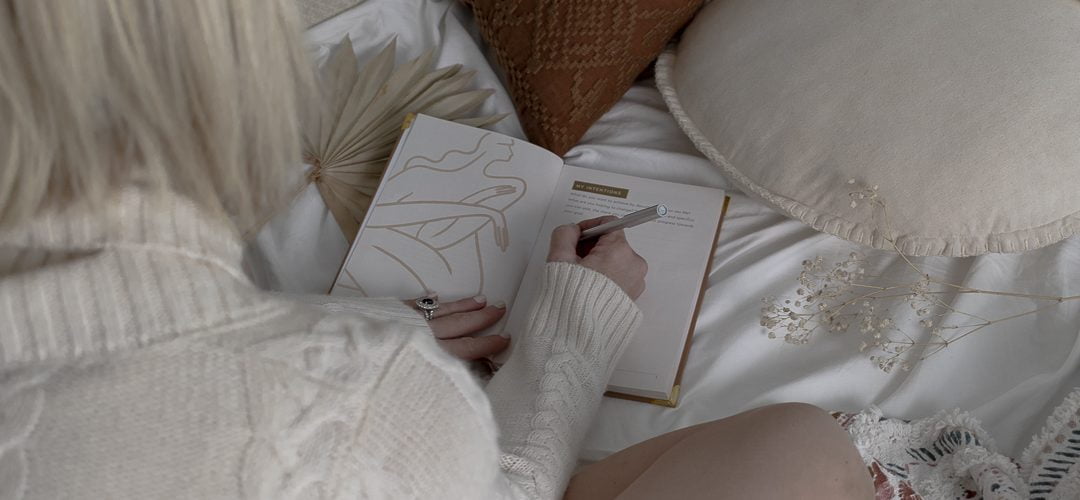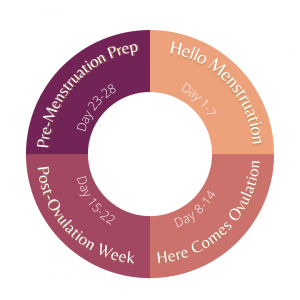How Your Menstrual Cycle Affects Your Sex Life
- September 3, 2021
- Posted by: Vanessa Tarfon
- Category: Intimacy , Self image , Sensual Self , Sex ,

Women are cyclical humans. Studies over and over have shown that men’s cognitions and emotions are relatively stable over time, however, women’s change with their menstrual cycle as various areas in the brain are triggered at different points. Different phases of the menstrual cycle exploit different traits in women – mood changes, sexual interest, eating habits and weight fluctuation, and even pain levels.
We are so used to thinking that menstruating women are “unclean” or to be “hidden” because that is what cultures have taught us.
Not all women are the same, so the below cyclical changes might affect you slightly differently. This information is based on the average female population and a 28-day cycle.
 Phase: Hello Menstruation (Day 1 – 7)
Phase: Hello Menstruation (Day 1 – 7)
- Oestrogen begins at its lowest and then rises during the week. Low oestrogen makes you want to curl up into a ball and stay home in your bubble, but as it rises you’ll find more energy, patience and an overall better mood (your household will stop walking on eggshells).
- Fatigue and a low mood are also a result of low iron from blood loss so eating iron-rich foods can help keep energy levels and mood up.
- The average woman loses around 30mls of blood. It’s a significant loss if you pull out your measuring cup and take a look! I’m not sure that a man would willingly lose this much blood and not complain about it.
- Thanks to general fatigue and a sullen mood, it’s not surprising that sensuality and sexual interest are at their lowest during this time.
Phase: It’s over here comes ovulation (Day 8-14)
- Oestrogen and testosterone rise until they peak providing more confidence, a better mood, and a greater ability to focus and think quickly making learning new skills and taking on challenges easier. Due to all this brain stimulation, some women can experience anxiety and yoga and meditation can be great for calming anxiety and an overactive mind.
- Pain is experienced at its lowest during this week as the high oestrogen triggers larger endorphin release masking pain. Your appetite is also lower and at its lowest during ovulation.
- Self-esteem and self-image are at a peak so it’s probably not surprising that sensuality and sexual interest is at a peak during this time and particularly around day 14 (ovulation). Oestrogen even boosts your attractiveness by creating subtle shifts in soft tissue making your facial features more symmetrical.
Phase: Post-ovulation week (Day 15-22)
- Progesterone rises, oestrogen and testosterone drop initially, then oestrogen rises again.
- Due to the initial drop in oestrogen, some women experience “pre-PMS” fatigue, low mood and irritability but this stops when oestrogen rises again at the end of the week.
- Rising progesterone makes you more sedate and fatigued and this week is your least energetic so be kind to yourself.
- Your appetite is high, thanks to your body thinking it MAY be pregnant, and cravings for comfort foods that are high in fat and calories are on the cards. Feeling hangry and irritable if you miss a meal is normal. Thanks to your body considering it might be pregnant your digestion is slower and water is retained – enter that bloated feeling.
- You can burn more fat during this time during exercise as your body is more efficient at using fat for fuel whilst it tries to conserve all other food nutrients.
- Sensuality and sexual interest reduce thanks to the rising progesterone and its emotional and physical effects. Emotional connection and bond are important during this week so keeping intimacy alive through bonding is a great option.
Phase: Pre-menstruation prep week (Day 23-28)
- Oestrogen and progesterone plummet lowering your mood and increasing irritability and anxiousness. Genes, as always play a role, BUT keeping a healthy lifestyle, including exercise, nutrition and sleep patterns, can help reduce the negative impacts during this time. Nutrition can be hard to maintain as reducing oestrogen makes you crave carb-rich foods. Chronic health issues such as asthma and endometriosis can worsen, but energy levels start to rise again from last week’s slump which is helpful.
- It’s not a good time to take on challenges or new activities because you’re more pessimistic than optimistic, so stick to what you know and what makes you happy to maintain your mood.
- Sensuality and sexual interest are welcomed back this week as we see a second sensuality peak thanks to more nerve ending stimulation in your genitals as they prepare for what’s coming.
How can you maintain your sensual self-image through all of these phases?
- Orgasm is great for pain relief – period pain included! Take extra precautions when needed, such as using lubricant or an Ohnut to ensure that the sexual activity itself isn’t painful and enjoy the relief that orgasm can bring.
- Let arousal get the better of you. Don’t squash your sexual appetite when it’s high, lean into it! Use those times to enjoy yourself whether with your partner or individually. The more you enjoy sexual activities the more you will crave them, and it doesn’t need to involve orgasm, pleasure is just as important.
- Non-genital practices to boost your internal and external connections. When your sexual appetite is low, maintain an intimate connection with yourself or your partner by doing non-genital activities such as massage, hugging, hand-holding or beauty self-care rituals.
Want to track your personal cyclical effects? The Mojo Matters Journal can help you do exactly that!
